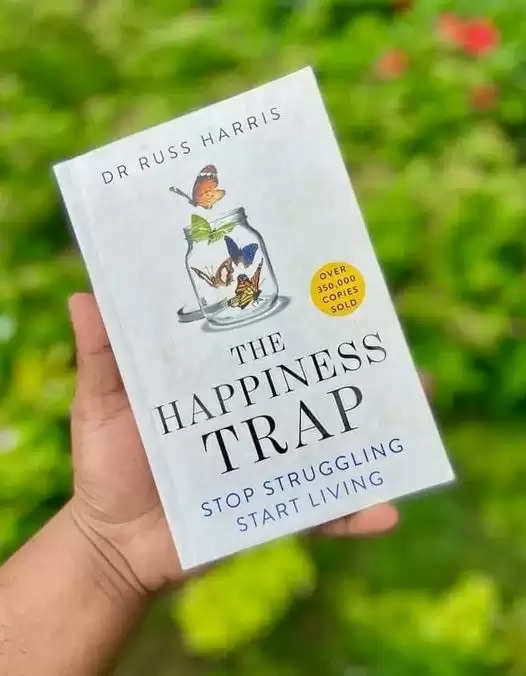7 lessons from "The Happiness Trap" by Russ Harris

In "The Happiness Trap," Russ Harris talks about Acceptance and Commitment Therapy (ACT) as a way to improve mental health. People who use this method can better handle their feelings and live a more satisfying life by using practical strategies. Based on Harris's ideas, here are seven useful tips that can make a big difference in how you deal with happiness and life's problems:
1. Practice Acceptance: One of the main ideas behind ACT is that you should learn to accept your thoughts and feelings instead of fighting them. Some people think that getting rid of their bad feelings is the only way to be happy, but this can work against them. Harris says that instead of trying to get rid of these feelings, we should welcome them with open arms. Being aware of your feelings without judging them lets you fully experience them. This behaviour can make them much less powerful over you. If you're nervous about a presentation, for example, don't try to push the worry away; instead, accept it as a part of what you're going through right now. This acceptance can make your worry less severe and help you deal with it better.
2. Identify Your Values: To live a worthwhile life, you need to know what really matters to you. Your values are the ideas that show what you want to do and stand for in life. Spend some time thinking about what's most important to you. Some examples are family, imagination, health, and personal growth. Make a list of these values and use them to help you make choices and set goals. You are more likely to feel fulfilled and like your life has a meaning when your actions are in line with your values. For instance, if family is one of your values, you might choose to spend quality time with family and friends over working long hours. This will add important connections to your life.
3. Be Mindful: Being mindful means focussing on the present moment without judging it. Adding mindfulness techniques to your daily life can have huge positive impacts on your mental health. Meditation, deep breathing routines, or just being curious about what's going on around you can help you become more aware and less stressed. Mindfulness makes you more aware of your inner and outer experiences, which makes you feel calmer and less affected by things that stress you out. For instance, practicing focused breathing for a few minutes every day can help you get in touch with your centre and do your daily tasks more calmly and with more focus.
4. Engage in Committed Action: An important part of ACT is acting on your values, even if it makes you feel bad. This means making goals that are in line with your values and working hard to reach them every day, no matter how you feel. Break your goals down into steps that you can handle, and make a promise to do these things regularly. This method helps people stay strong and make progress, even when their drive changes. For example, if you want to improve yourself and learn a new skill, you should make a promise to practise it every day, even if you have failures or feel down. This kind of hard work can pay off in the end, leading to big successes and personal happiness.
5. Challenge Unhelpful Thoughts: It's common for negative thoughts to be skewed and not helpful. When these kinds of thoughts come up, it's a good idea to ask yourself if they're true. You should ask yourself if these thoughts are based on facts or just opinions. This changes the way you think helps you see things more clearly and calms you down. For example, if you think, "I'll never be good enough," remind yourself of the good things you've done in the past and your skills. By analysing and re-framing your thoughts, you can lessen the bad effects they have on you and develop a more healthy mind.
6. Limit the Pursuit of Happiness: The never-ending search for happiness can sometimes leave people feeling let down and unhappy. Harris says you should stop looking for happiness as an end goal and instead focus on having a meaningful life that is in line with your values. Rather than being a clear goal, happiness often comes about as a result of living a life based on values. Accept that it's normal to feel different emotions, and know that meaningful relationships and hobbies are more important for long-term happiness than always trying to be happy. Doing volunteer work or working on a project you're really interested in might not always make you happy, but it can give you a strong sense of meaning and satisfaction.
7. Cultivate Self-Compassion: Being self-compassionate means being kind and understanding to yourself the way you would be with a friend. It's important to remember that everyone has problems and that it's okay to feel weak during tough times. Being kind to yourself can help you deal with your emotions and feel better in general. If you make a mistake or have a failure, for example, don't be hard on yourself. Instead, give yourself kind words of support and encouragement. Realise that flaws are part of being human, and by learning to be kind to yourself, you can handle problems more easily and with more grace.
These seven useful tips from "The Happiness Trap" are based on the ideas of Acceptance and Commitment Therapy. They promote a balanced way of living that puts ideals, self-acceptance, and being mindful first. By using these tips, you can stop trying to be happy all the time, which isn't possible. Instead, you can focus on having a life full of meaning and satisfaction.

Book: https://amzn.to/3XkGuAR
--
-- Thanks For Reading --
You Might Also Like: Think and Grow Rich: The Legacy – Key Lessons from Top Entrepreneurs and Thought Leaders
